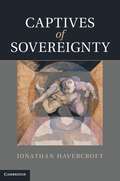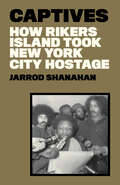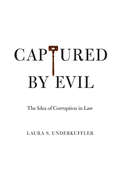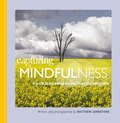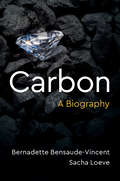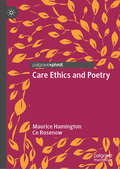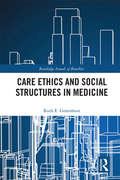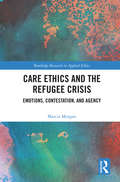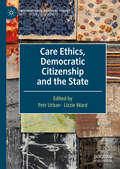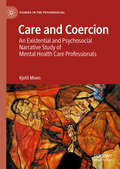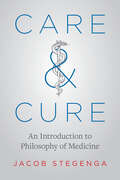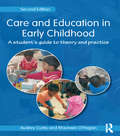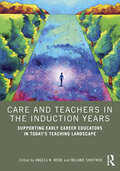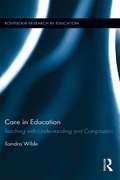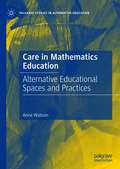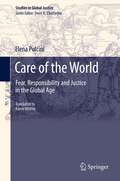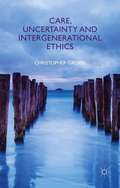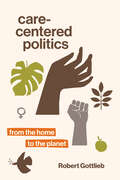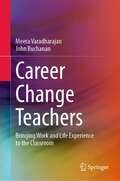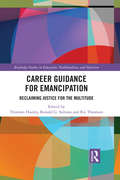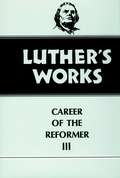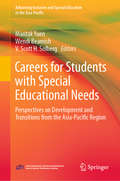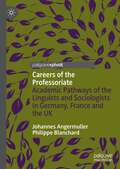- Table View
- List View
Captives of Sovereignty
by Jonathan HavercroftA picture of sovereignty holds the study of politics captive. Captives of Sovereignty looks at the historical origins of this picture of politics, critiques its philosophical assumptions and offers a way to move contemporary critiques of sovereignty beyond their current impasse. The first part of the book is diagnostic. Why, despite their best efforts to critique sovereignty, do political scientists who are dissatisfied with the concept continue to reproduce the logic of sovereignty in their thinking? Havercroft draws on the writings of Hobbes and Spinoza to argue that theories of sovereignty are produced and reproduced in response to skepticism. The second part of the book draws on contemporary critiques of skeptical arguments by Wittgenstein and Cavell to argue that their alternative way of responding to skepticism avoids the need to invoke a sovereign as the final arbiter of all political disputes.
Captives: How Rikers Island Took New York City Hostage
by Jarrod ShanahanThe definitive history of America&’s most notorious jail and the violent rise of New York City&’s law-and-order movement Captives combines a thrilling account of Rikers Island&’s descent into infamy with a dramatic retelling of the last seventy years of New York politics from the vantage point of the city&’s jails. It is the story of a crowded field of contending powers—city bureaucrats and unions, black power activists and guards, crooked cops and elected leaders—struggling for power and influence, a tale culminating in mass incarceration and the triumph of neoliberalism. It is a riveting chronicle of how the Rikers Island of today—and the social order it represents—came to be. Conjuring sweeping cinematic vistas, Captives records how the tempo of history was set by bloody and bruising clashes between guards and prisoners, between rank and filers and union bosses, between reformers and reactionaries, and between police officers and virtually everyone else. Written by a one-time Rikers prisoner, Captives draws on extensive archival research, decades of journalism, interviews, prisoner testimonials, and firsthand experience to deliver an urgent intervention into our national discussion about the future of mass incarceration and the call to abolish prisons. The contentious debate about the future of the Rikers Island penal colony rolls onward, and Captives is a must-read for anyone interested in the island and what it represents.
Captured by Evil
by Laura S. UnderkufflerOne of the most powerful words in the English language, "corruption" is also one of the most troubled concepts in law. According to Laura Underkuffler, it is a concept based on religiously revealed ideas of good and evil. But the notion of corruption defies the ordinary categories by which law defines crimes—categories that punish acts, not character, and that eschew punishment on the basis of religion and emotion. Drawing on contemporary examples—including former assemblywoman Diane Gordon and former governor Rod Blagojevich—Underkuffler explores the implications and dangers of maintaining such an archaic concept at the heart of criminal law. "Underkuffler challenges the traditional rational and logical characterizations of corruption and defends a highly original and insightul proposal. In her view corruption is an emotional concept grounded in religious ideas defying traditional criminal law doctrines. This book is a fantastic contribution to the study of corruption as well as more generally to the study of law and culture. "—Alon Harel, Hebrew University Law School
Capturing Mindfulness
by Matthew JohnstoneThere are few better ways to consciously slow down and truly engage with your surroundings than when you are armed with a camera. With Capturing Mindfulness, de-stressing and being in the moment needn't be limited to simple diary-keeping and fill-in journals; instead you can capture it with your lens. Bestselling author Matthew Johnstone's latest book Capturing Mindfulness, is a natural follow on from his last book Quiet the Mind which came out in 2012.Matthew has been practicing what he terms 'photopresent' for the last 15 years and believes that next to meditation, this is one of the most creative and enjoyable ways to attain mindfulness in day-to-day life. The very essence of photography; after all, is all about focus and capturing 'the moment'.Matthew is fascinated by light, colour, composition and most importantly how he can see the world differently. For him, having camera in your hands is the reminder to consciously slow everything down from your breath, to your walk, to your thoughts and begin to really observe your surroundings as if seeing them for the first time.Mindfulness photography is about seeing something that no one else can, capturing something that will never happen again and finding beauty where it doesn't typically exist. When we become more consciously aware of where we are, what we're doing and what we're thinking, life can become calmer, more enjoyable and generally more manageable.
Carbon: A Biography
by Sacha Loeve Bernadette Bensaude-VincentCarbon is much more than a chemical element: it is a polymorphic entity with many faces, at once natural, cultural and social. Ranging across ten million different compounds, carbon has as many personas in nature as it has roles in human life on earth. And yet it rarely makes the headlines as anything other than the villain of our fossil-based economy, feeding an addiction which is driving dangerous levels of consumption and international conflict and which, left unchecked, could lead to our demise as a species. But the impact of CO₂ on climate change only tells part of the story, and to demonize carbon as an element which will bring about the downfall of humanity is to reduce it to a pale shadow of itself. In this major new history of carbon, Bernadette Bensaude-Vincent and Sacha Loeve show that this omnipresent element is at the root of countless histories and adventures through time, thanks to its extraordinary versatility. Carbon has a long and prestigious CV: its work and achievements extend far beyond the burning of fossil fuels. The fourth most abundant element in the universe and the second most abundant element in the human body, carbon is the chemical basis of all known life. Carbon chemistry has a long history, with applications ranging from jewellery to heating, underpinning developments in metallurgy, textiles, pharmaceuticals, electronics, nanoscience and green technologies. A biography of carbon transgresses the boundaries between chemical and social existence, between nature and culture, forcing us to abandon the simplified image of carbon as the anti-hero of human civilization and enabling us to see instead the great diversity of carbon’s modes of existence. With scientific precision and literary flair, Bensaude-Vincent and Loeve unravel the surprising ways in which carbon has shaped our world, showing how unrecognizable the earth would be without it. Uncovering the many hidden lives of carbon allows us to view our own with fresh eyes.
Carceral Humanitarianism: Logics of Refugee Detention (Forerunners: Ideas First)
by Kelly OliverCoopted by military operations, humanitarianism has never been neutral. Rather than welcoming refugees, host countries assess the relative risks of taking them in versus turning them away, using a risk-benefit analysis that often reduces refugees to collateral damage in proxy wars fought in the war on terrorism. Carceral Humanitarianism testifies that humanitarian aid and human rights discourse are always political and partisan. Forerunners is a thought-in-process series of breakthrough digital works. Written between fresh ideas and finished books, Forerunners draws on scholarly work initiated in notable blogs, social media, conference plenaries, journal articles, and the synergy of academic exchange. This is gray literature publishing: where intense thinking, change, and speculation take place in scholarship.
Care Ethics and Poetry
by Maurice Hamington Ce RosenowCare Ethics and Poetry is the first book to address the relationship between poetry and feminist care ethics. The authors argue that morality, and more specifically, moral progress, is a product of inquiry, imagination, and confronting new experiences. Engaging poetry, therefore, can contribute to the habits necessary for a robust moral life—specifically, caring. Each chapter offers poems that can provoke considerations of moral relations without explicitly moralizing. The book contributes to valorizing poetry and aesthetic experience as much as it does to reassessing how we think about care ethics.
Care Ethics and Social Structures in Medicine (Routledge Annals of Bioethics)
by Ruth E. GroenhoutThis book examines the central structures in medicine—medical knowledge, economics, technological innovation, and medical authority—from the perspective of an ethics of care. The author analyzes each of these structures in detail before considering the challenges they present to end of life care. The perspective of an ethics of care allows for a careful focus on how these structures affect the capacity of the health care system to provide the care patients need, on the impact they have on the relationships between patients and care-givers, and on how they affect the care-givers in terms of their own sense of identity and capacity for care. This book offers one of the first focused discussions of an ethics of care across a wide range of social issues and structures in contemporary medicine. It will be of keen interest to advanced students and scholars in bioethics and health care ethics who are interested in these important issues.
Care Ethics and the Refugee Crisis: Emotions, Contestation, and Agency (Routledge Research in Applied Ethics)
by Marcia MorganThis book advocates for the philosophical import of care in re-evaluating problems of humanitarianism in the context of the ongoing international refugee and forced migration situation. In doing so, it rethinks the human capacity to care about the suffering of distant others. At a time when emotional resources are running low, there is a need to recast what it means to care, with the aim of generating a productive movement against the rise of value fundamentalism globally—embraced in mantras of ‘good and evil’ and ‘us and them’—and to confront xenophobia and oppressive politics. The author draws upon a wide array of rich traditions, including historical and contemporary writings on self-care and care of the other, to re-examine the intersection of care ethics and justice. She also rethinks the relationship between care and contestation, here analyzed in the aesthetic, ethical, political, and religious domains of human experience. From within the context of this contingent historical repetition of political oppression, the book constructs a reminder not only of what it feels like to care, but how and why we should act upon our care. Care Ethics and the Refugee Crisis is an important contribution to the growing literatures on care ethics and immigration/forced migration in philosophy. It will also appeal to scholars and advanced students working in other disciplines such as political science, refugee and migration studies, and social anthropology.
Care Ethics in the Age of Precarity
by Maurice Hamington Michael FlowerHow care can resist the stifling force of the neoliberal paradigm In a world brimming with tremendous wealth and resources, too many are suffering the oppression of precarious existences—and with no adequate relief from free market–driven institutions. Care Ethics in the Age of Precarity assembles an international group of interdisciplinary scholars to explore the question of care theory as a response to market-driven capitalism, addressing the relationship of three of the most compelling social and political subjects today: care, precarity, and neoliberalism. While care theory often centers on questions of individual actions and choices, this collection instead connects theory to the contemporary political moment and public sphere. The contributors address the link between neoliberal values—such as individualism, productive exchange, and the free market—and the pervasive state of precarity and vulnerability in which so many find themselves. From disability studies and medical ethics to natural-disaster responses and the posthuman, examples from Māori, Dutch, and Japanese politics to the COVID-19 pandemic and the Black Lives Matter movement, this collection presents illuminating new ways of considering precarity in our world. Care Ethics in the Age of Precarity offers a hopeful tone in the growing valorization of care, demonstrating the need for an innovative approach to precarity within entrenched systems of oppression and a change in priorities around the basic needs of humanity.Contributors: Andries Baart, U Medical Center Utrecht, Tilburg U, and Catholic Theological U Utrecht, the Netherlands; Vrinda Dalmiya, U of Hawaii, Mānoa; Emilie Dionne, U Laval; Maggie FitzGerald, U of Saskatchewan; Sacha Ghandeharian, Carleton U; Eva Feder Kittay, Stony Brook U/SUNY; Carlo Leget, U of Humanistic Studies in Utrecht, the Netherlands; Sarah Clark Miller, Penn State U; Luigina Mortari, U of Verona; Yayo Okano, Doshisha U, Kyoto, Japan; Elena Pulcini, U of Florence.
Care Ethics, Democratic Citizenship and the State (International Political Theory)
by Petr Urban Lizzie WardThis book reflects on theoretical developments in the political theory of care and new applications of care ethics in different contexts. The chapters provide original and fresh perspectives on the seminal notions and topics of a politically formulated ethics of care. It covers concepts such as democratic citizenship, social and political participation, moral and political deliberation, solidarity and situated attentive knowledge. It engages with current debates on marketizing and privatizing care, and deals with issues of state care provision and democratic caring institutions. It speaks to the current political and societal challenges, including the crisis of Western democracy related to the rise of populism and identity politics worldwide. The book brings together perspectives of care theorists from three different continents and ten different countries and gives voice to their unique local insights from various socio-political and cultural contexts.Chapter 11 is available open access under a Creative Commons Attribution 4.0 International License via link.springer.com.
Care and Coercion: An Existential and Psychosocial Narrative Study of Mental Health Care Professionals (Studies in the Psychosocial)
by Kjetil MoenThis book presents an existential and psychosocial interpretation of the experiences of mental health care practitioners whose work involves use of coercion. Through in-depth case studies carried out in Norway, and theoretical discussions, it examines how the use of coercion is not merely directed by laws and regulations, but also by the situated subjectivities of the practitioners, and the wider contexts informing them. It demonstrates how the inner and outer worlds, the psychic and the social, and the existential and the cultural, all impact the professionals' experience and capacity to care. Employing a phenomenological and contextual approach, the book explores the practitioners’ paradoxical experiences of mandating and physically undertaking coercive measures toward vulnerable patients, while at the same time being members of a democratic society in which autonomy is a defining feature. It demonstrates the impact on professionals who are both authorized to use coercion and critiqued by the authorities for doing so. The author discusses what informs the moral deliberations taking place within and between professional subjects in charged situations involving use of coercion, and how the experience of using coercion informs the self-understanding of the professional and thus potentially future decision-making processes pertaining to the use of coercive measures. In doing so the book provides a look behind closed doors of “total institutions” that addresses, and partly undresses, psychiatric power. This book offers a rich, contextual examination of mental health care practice that will be of interest to students, practitioners, and researchers of psychiatry, as well as those of adjacent fields such as psychology, social work, nursing, and criminology.
Care and Cure: An Introduction to Philosophy of Medicine
by Jacob StegengaThe philosophy of medicine has become a vibrant and complex intellectual landscape, and Care and Cure is the first extended attempt to map it. In pursuing the interdependent aims of caring and curing, medicine relies on concepts, theories, inferences, and policies that are often complicated and controversial. Bringing much-needed clarity to the interplay of these diverse problems, Jacob Stegenga describes the core philosophical controversies underlying medicine in this unrivaled introduction to the field. The fourteen chapters in Care and Cure present and discuss conceptual, metaphysical, epistemological, and political questions that arise in medicine, buttressed with lively illustrative examples ranging from debates over the true nature of disease to the effectiveness of medical interventions and homeopathy. Poised to be the standard sourcebook for anyone seeking a comprehensive overview of the canonical concepts, current state, and cutting edge of this vital field, this concise introduction will be an indispensable resource for students and scholars of medicine and philosophy.
Care and Education in Early Childhood: A Student's Guide to Theory and Practice
by Audrey Curtis Maureen O'HaganThe authors draw on their extensive early years experience to provide a comprehensive and up-to-date review of the key issues in the field of early childhood care and education. In this fully updated and revised new edition, rewritten to include the new Early Years Foundation Stage, students will find that this text now meets the needs of students on Foundation degrees, Early Childhood Degrees and the new Early Years Professional qualification. Topics covered in this essential textbook include: an overview of the principles of effective practice discussions on equal opportunities and children's rights an update of the latest development theories relating to brain development and how children learn and the difficulties children may face in their learning investigations into what working with parents really means consideration of the different early years systems in operation summaries of key management issues and useful information on how to address them comparison with European perspectives on early years care and education the importance of play in children's early learning. Readers of this second edition will also find the expansion of existing chapters in order to include topics such as inclusion, transitions, child protection in relation to the internet and partnerships with parents. The book covers the whole age range from birth to eight years with a special section on the birth to three years age group. Each chapter is fully referenced and has case studies or reflective practice boxes within the text. Informative and engaging, the book challenges the reader to think about how underlying theory may be reflected in practice. It will be essential reading for all students who are studying for early childhood qualifications at levels four, five and six.
Care and Teachers in the Induction Years: Supporting Early Career Educators in Today’s Teaching Landscape
by Melanie Shoffner Angela W. WebbThis edited volume focuses on understandings and enactments of care in teacher induction in a landscape reshaped by the recent pandemic, ongoing societal issues, and increased expectations of teachers. Building on the editors’ book Reconstructing Care in Teacher Education after COVID-19: Caring Enough to Change, this volume extends reconsiderations of care and teacher development into K-12 schools, aiming to explore how care is, should, and can be operationalized in teacher induction now.Each chapter draws on research, practice, and reflection to provide recommendations to move teacher induction forward in responsive and caring ways. Authors include teacher educators, practicing teachers, and administrators representing different subject areas and educational levels. The operationalization of care also takes many forms, from mentorship and professional learning communities to support in navigating burnout and staff shortages. Chapters offer specific examples from contributors’ own teaching experiences and conclude with suggestions for adapting the model or practice for readers’ own programs and students.Ideal for faculty working with preservice educators and administrators supporting newly hired teachers, this book can also serve as recommended or supplementary reading in undergraduate or graduate teacher education, curriculum and instruction, leadership, and educational administration courses as well as within professional development opportunities.
Care in Education: Teaching with Understanding and Compassion (Routledge Research in Education #88)
by Sandra WildeThis philosophical commentary explores the meaning and significance of care in education, demonstrating how teaching with care enriches the art and soul of pedagogy. Wilde draws upon Western and Eastern philosophies that envision an integrated image of care to illuminate the value of cultivating understanding in the form of awareness, and compassion leading to right action. Comments and stories from teachers’ experiences demonstrate important aspects of care that are easily overlooked, such as present attention, listening and teacher, well-being. Although it uncovers a tragic conflict between caring and aspects of contemporary schooling, this book offers hope for teachers. It shares a vision of practice that has the potential to re-enliven and strengthen care even in the midst of these difficulties. It also offers a contemplative approach to pedagogy that calls educators into intentional action, showing them how to renew their deep ethical connections to students, to subject matter and to the world.
Care in Mathematics Education: Alternative Educational Spaces and Practices (Palgrave Studies in Alternative Education)
by Anne WatsonThis book investigates the process of care in mathematics teaching. The author proposes transformative educational spaces in which learning mathematics, rather than consisting of a repetitive grind of exercises and facts, can become a part of learner identity. This book describes examples of mathematics teachings in a wide range of contexts and pedagogies, coordinated to identify common features where care for mathematical learning and thinking is combined with care for learners. Along with detailing caring mathematics education practices in alternative spaces, the author demonstrates similar practices alive even with the current mainstream spaces of acquisition and performance. Care is integrated through listening, and developing responsive and trusting relationships. It will be of interest to scholars of mathematics education, as well as pre-service and in-service teachers and teacher educators.
Care of the World: Fear, Responsibility and Justice in the Global Age (Studies in Global Justice #11)
by Elena Pulcini Karen WhittleThis book proposes a philosophy of care in a global age. It discusses the distinguishing and opposing pathologies produced by globalization: unlimited individualism or self-obsession, manifested as (Promethean) omnipotence and (narcissistic) indifference, and endogamous communitarianism or an 'us'-obsession that results in conflict and violence. The polarization between a lack and an excess of pathos is reflected in the distorted forms taken on by fear. The book advocates a metamorphosis of fear, which may restore in the subject an awareness of vulnerability and become the precondition for moral action. Such awareness and the recognition of the condition of contamination caused by the other's unavoidable presence teach us to fear for rather than be afraid of. Fear for the world means care of the world, and care, understood as concern and solicitude, is a new notion of responsibility, in which the stress is shifted to a relational subject capable of responding to and taking care of the other. From a global perspective, the proposed vision of care also compels us to explore a new paradigm of justice.
Care, Uncertainty And Intergenerational Ethics
by Christopher GrovesOur capacity to reshape the future has never been more powerful. Yet our ability to foresee the consequences of what we do has not kept pace. Is the idea that we have responsibilities to future generations therefore meaningful? This book argues that it is, with the aid of a unique reading of the care ethics tradition.
Care-Centered Politics: From the Home to the Planet
by Robert GottliebWhy a care economy and care-centered politics can influence and reorient such issues as health, the environment, climate, race, inequality, gender, and immigration.This agenda-setting book presents a framework for creating a more just and equitablecare-centered world. Climate change, pandemic events, systemic racism, and deep inequalities have all underscored the centrality of care in our lives. Yet care work is, for the most part, undervalued and exploited. In this book, Robert Gottlieb examines how a care economy and care politics can influence and remake health, climate, and environmental policy, as well as the institutions and practices of daily life. He shows how, through this care-centered politics, we can build an ethics of care and a society of cooperation, sharing, and solidarity. Arguing that care is a form of labor, Gottlieb expands the ways we think about home care, child care, elder care, and other care relationships. He links them to the Green New Deal, Medicare for All, immigration, and the militarization of daily life. He also provides perspective on the events of 2020 and 2021 (including the COVID-19 pandemic, climate change, and movements calling attention to racism and inequality) as they relate to a care politics. Care, says Gottlieb, must be universal—whether healthcare for all, care for the earth, care at work, or care for the household, shared equally by men and women. Care-centered politics is about strategic and structural reforms that imply radical and revolutionary change. Gottlieb offers a practical, mindful, yet also utopian, politics of daily life.
Career Change Teachers: Bringing Work and Life Experience to the Classroom
by John Buchanan Meera VaradharajanCareer Change Teachers Bringing Work and Life Experience to the Classroom
Career Guidance for Emancipation: Reclaiming Justice for the Multitude (Routledge Studies in Education, Neoliberalism, and Marxism #18)
by Tristram Hooley Ronald G. Sultana Rie ThomsenThis edited collection explores ways in which social justice can be integrated into career guidance practice. Chapter authors propose models and practices which can contribute to struggles for social justice and consider how career guidance can play a role in these struggles. They explore policy and practice in the light of critical social theory both critiquing career guidance and opening up new possibilities for the field. The volume moves the discipline away from its overwhelming reliance on psychology in favor of theoretically pluralistic approaches informed by critical thinking in a range of disciplines. It seeks to expand the possibilities that are available to career guidance practitioners and researchers to support the growth of human flourishing and solidarity.
Career of The Reformer (Luther's Works #33)
by Martin Luther Philip S. Watson Helmut T. LehmannOn the Bondage of the Will was considered by Luther himself as one of his best writings. This particular treatise is a reply to Erasmus' work On the Freedom of the Will. Students of Luther and the Reformation period will welcome the helpful footnotes and many excerpts from Erasmus' writings that accompany On the Bondage of the Will.
Careers for Students with Special Educational Needs: Perspectives on Development and Transitions from the Asia-Pacific Region (Advancing Inclusive and Special Education in the Asia-Pacific)
by Wendi Beamish Mantak Yuen V. Scott H. SolbergThis book addresses in detail a range of issues in connection with preparing individuals with disabilities or other special needs for gaining employment and planning a career path beyond school. It presents strategies for personnel preparation, parent education, effective programs for career development and transitions, policies and policy research, and useful tools for assessment and intervention. The clear explanations of essential theories, research findings, policies, and practices for career development ensure that readers gain a deeper understanding of all the issues involved. Most importantly, they will learn several strategies that can be used to prepare students for employment within global and Asia-Pacific regional contexts.
Careers of the Professoriate: Academic Pathways of the Linguists and Sociologists in Germany, France and the UK
by Philippe Blanchard Johannes AngermullerThis book examines career patterns of the professoriate. Professors may appear as specialised individualists in their fields, and yet they follow pathways which are anything but unique. Drawing from a unique data set, the authors analyse the trajectories of the almost 2000 linguists and sociologists who hold full professorships in Germany, France and the UK in 2015. With a background in social theory, they reveal models, structures and rules that organise the professional lives and biographies of the most senior academics. This book presents the results of a systematic empirical study, which will be of interest to specialists in higher education studies as well as to linguists and sociologists, and to all academics more generally.
